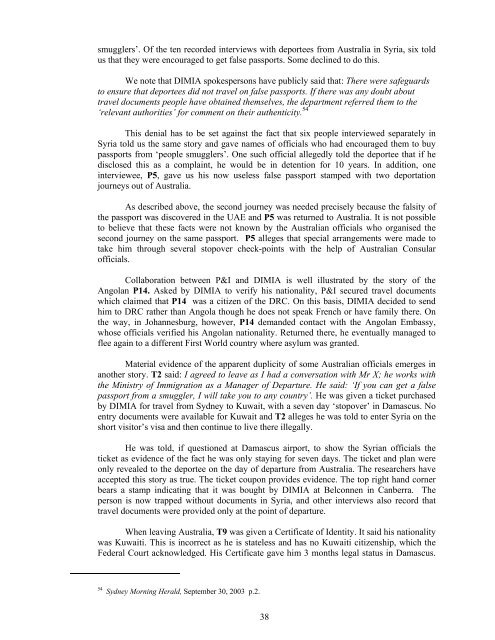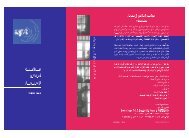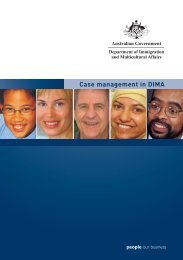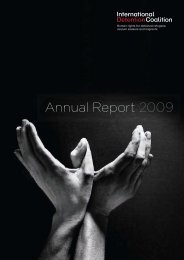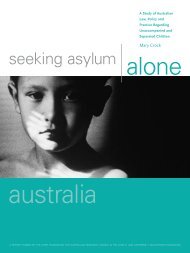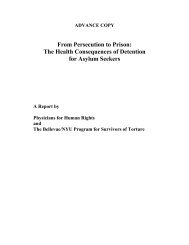DEPORTED TO DANGER - Edmund Rice Centre
DEPORTED TO DANGER - Edmund Rice Centre
DEPORTED TO DANGER - Edmund Rice Centre
Create successful ePaper yourself
Turn your PDF publications into a flip-book with our unique Google optimized e-Paper software.
smugglers’. Of the ten recorded interviews with deportees from Australia in Syria, six toldus that they were encouraged to get false passports. Some declined to do this.We note that DIMIA spokespersons have publicly said that: There were safeguardsto ensure that deportees did not travel on false passports. If there was any doubt abouttravel documents people have obtained themselves, the department referred them to the‘relevant authorities’ for comment on their authenticity. 54This denial has to be set against the fact that six people interviewed separately inSyria told us the same story and gave names of officials who had encouraged them to buypassports from ‘people smugglers’. One such official allegedly told the deportee that if hedisclosed this as a complaint, he would be in detention for 10 years. In addition, oneinterviewee, P5, gave us his now useless false passport stamped with two deportationjourneys out of Australia.As described above, the second journey was needed precisely because the falsity ofthe passport was discovered in the UAE and P5 was returned to Australia. It is not possibleto believe that these facts were not known by the Australian officials who organised thesecond journey on the same passport. P5 alleges that special arrangements were made totake him through several stopover check-points with the help of Australian Consularofficials.Collaboration between P&I and DIMIA is well illustrated by the story of theAngolan P14. Asked by DIMIA to verify his nationality, P&I secured travel documentswhich claimed that P14 was a citizen of the DRC. On this basis, DIMIA decided to sendhim to DRC rather than Angola though he does not speak French or have family there. Onthe way, in Johannesburg, however, P14 demanded contact with the Angolan Embassy,whose officials verified his Angolan nationality. Returned there, he eventually managed toflee again to a different First World country where asylum was granted.Material evidence of the apparent duplicity of some Australian officials emerges inanother story. T2 said: I agreed to leave as I had a conversation with Mr X; he works withthe Ministry of Immigration as a Manager of Departure. He said: ‘If you can get a falsepassport from a smuggler, I will take you to any country’. He was given a ticket purchasedby DIMIA for travel from Sydney to Kuwait, with a seven day ‘stopover’ in Damascus. Noentry documents were available for Kuwait and T2 alleges he was told to enter Syria on theshort visitor’s visa and then continue to live there illegally.He was told, if questioned at Damascus airport, to show the Syrian officials theticket as evidence of the fact he was only staying for seven days. The ticket and plan wereonly revealed to the deportee on the day of departure from Australia. The researchers haveaccepted this story as true. The ticket coupon provides evidence. The top right hand cornerbears a stamp indicating that it was bought by DIMIA at Belconnen in Canberra. Theperson is now trapped without documents in Syria, and other interviews also record thattravel documents were provided only at the point of departure.When leaving Australia, T9 was given a Certificate of Identity. It said his nationalitywas Kuwaiti. This is incorrect as he is stateless and has no Kuwaiti citizenship, which theFederal Court acknowledged. His Certificate gave him 3 months legal status in Damascus.54 Sydney Morning Herald, September 30, 2003 p.2.38


